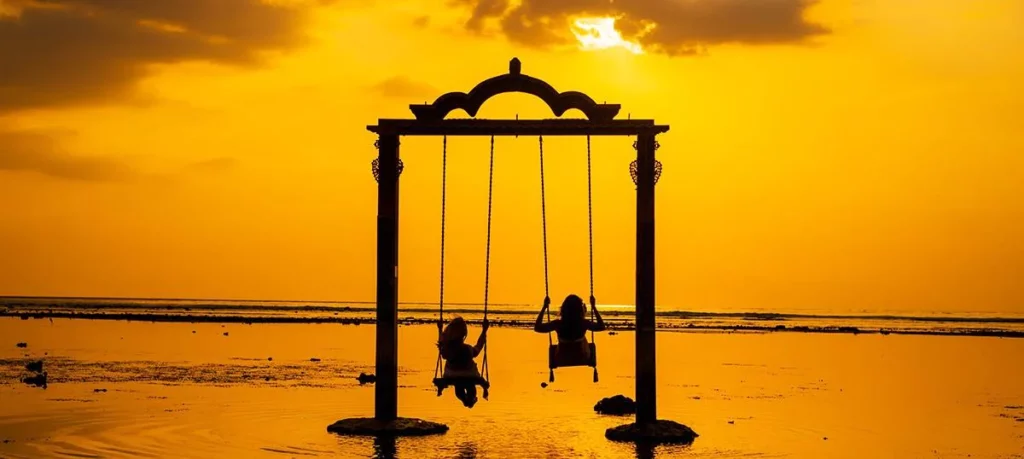Tri Hita Karana
Tri Hita Karana is a Balinese philosophical concept that emphasizes the pivotal balance between three vital relationships for achieving prosperity and well-being.
The connection between humans and nature (Palemahan), between humans themselves (Pawongan), and between humans and the divine (Parhyangan).
This philosophy asserts that true harmony, happiness, and prosperity arise from maintaining equilibrium in these interconnected realms, shaping the cultural, spiritual, and ecological practices of Balinese society.
From the verdant terraced rice paddies to the vibrant ceremonies that paint the streets, Bali is more than just a tropical paradise; it’s a land that pulsates with spiritual energy and a profound respect for nature. As an expat who has been fortunate to call Bali home, I’ve come to deeply appreciate the core philosophy that underpins this way of life: Tri Hita Karana.

What is Tri Hita Karana?
Translating roughly to the “Three Causes of Prosperity,” Tri Hita Karana encapsulates the balance between three vital relationships: humans with nature (Palemahan), humans with humans (Pawongan), and humans with the divine (Parhyangan). The Balinese believe that true happiness and prosperity can only be achieved when there is harmony in all three areas.
1. Palemahan (Humans and Nature)
Upon setting foot on Bali, one quickly recognizes the profound connection the Balinese share with their land. The iconic rice terraces, or subak system, are a testament to this. More than just agricultural fields, they are a manifestation of community-based water management which has sustained life here for centuries. By working with the natural topography and water sources, the Balinese showcase a symbiotic relationship where nature nourishes humans and, in turn, humans respect and protect nature.
2. Pawongan (Humans and Humans)
Community plays a pivotal role in Balinese society. From banjar meetings (local community gatherings) to the preparation of ceremonies, communal endeavors are intrinsic. The idea is simple: collective well-being over individual gain. It’s not unusual for locals and even some expats to contribute time, resources, or skills to community projects or celebrations.
3. Parhyangan (Humans and the Divine)
Religion and spirituality are interwoven into the very fabric of daily Balinese life. The island is dotted with pura (temples), each honoring different deities and ancestors. Every day, locals present canang sari – handmade offerings made of flowers, food, and incense – to appease and thank the gods. These rituals are not just symbolic but are a daily testament to the gratitude and recognition of the divine in all aspects of life.

How Tri Hita Karana Impacts Daily Life in Bali
As an expat, understanding and respecting Tri Hita Karana is not just a pathway to integrating into the local community, but it also offers a unique perspective on life.
- Sustainability: The reverence for nature pushes one towards sustainable practices. From reducing plastic usage to supporting organic farming, there’s a continuous endeavor to lessen our ecological footprint.
- Community Bonds: Sharing a meal with neighbors, participating in local ceremonies, or simply lending a hand in community projects can create lasting friendships and enrich one’s experience in Bali.
- Mindfulness and Gratitude: Observing the daily rituals and ceremonies serves as a constant reminder to be present, cherish every moment, and cultivate gratitude for the abundance that surrounds us.
Embracing Tri Hita Karana as an Expat
For those choosing Bali as a temporary or permanent home, embracing Tri Hita Karana is not just about assimilation. It’s an opportunity to redefine one’s relationship with the world. By seeking harmony with nature, fostering genuine relationships, and acknowledging the divine in daily life, one doesn’t just exist in Bali – one thrives in true Balinese spirit.
In a world increasingly driven by individualism and materialism, the principles of Tri Hita Karana remind us of the age-old truths of connection, balance, and harmony. As expats and visitors, it’s our privilege and responsibility to respect and uphold these principles, ensuring that Bali remains the enchanting island it has been for millennia.






